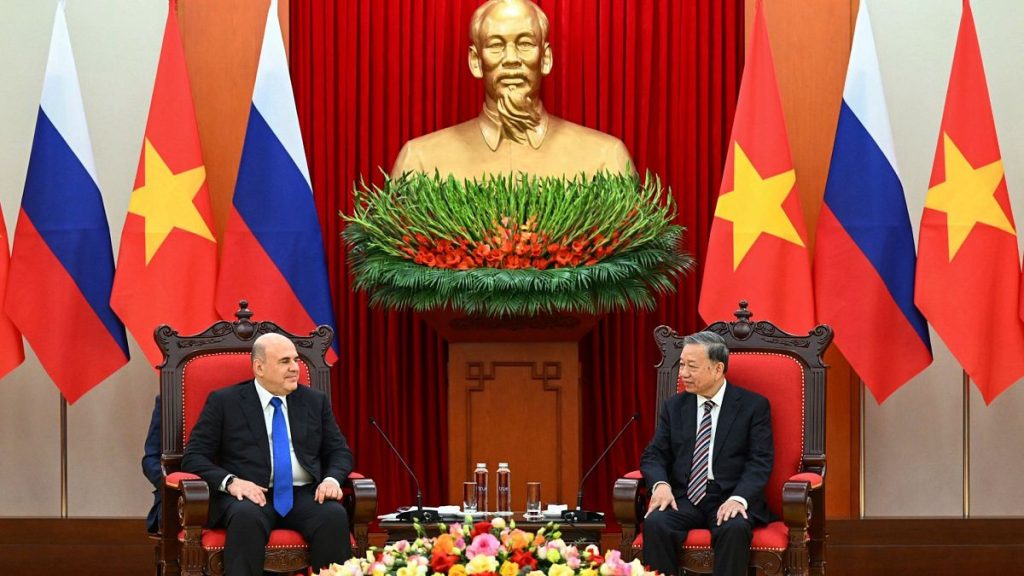Vietnam’s pursuit of energy independence and its commitment to achieving net-zero greenhouse gas emissions by 2050 have prompted the Southeast Asian nation to re-evaluate its nuclear energy ambitions. This renewed interest culminated in a significant agreement signed with Russia during Russian Prime Minister Mikhail Mishustin’s visit to Hanoi in late April 2024. The agreement between Rosatom, Russia’s state-owned nuclear energy corporation, and Vietnam’s state power utility, EVN, signals a potential revival of Vietnam’s nuclear program, which was shelved in 2016 due to escalating costs and safety concerns following the Fukushima disaster. The agreement underscores Vietnam’s growing energy demands and its recognition of nuclear power as a potentially viable option to meet these demands while simultaneously addressing climate change commitments. The partnership with Russia offers Vietnam access to established nuclear technology and expertise, facilitating a quicker path towards realizing its nuclear energy goals.
This renewed focus on nuclear energy reflects a broader shift in Vietnam’s energy strategy. The country’s rapid economic growth has led to a surge in energy consumption, putting a strain on existing resources and raising concerns about energy security. While Vietnam has traditionally relied on hydropower and fossil fuels, these sources face limitations. Hydropower projects are increasingly controversial due to their environmental impact, and dependence on fossil fuels contributes to both air pollution and greenhouse gas emissions. Nuclear energy presents an alternative that can potentially address both energy security and environmental concerns, offering a reliable, low-carbon source of electricity. While the 2016 decision to halt nuclear plant construction was influenced by cost overruns and public anxieties about safety, the current energy landscape and the urgency of climate action have prompted a reassessment of the role nuclear power can play in Vietnam’s energy future.
The agreement with Russia encompasses a wide range of cooperative initiatives, including the construction of nuclear power plants, the establishment of research centers, and the transfer and localization of Russian nuclear technology. Rosatom’s Director General, Alexey Likhachev, expressed the company’s commitment to providing comprehensive support to Vietnam in developing its nuclear infrastructure. Beyond the direct construction of power plants, the agreement emphasizes the importance of fostering local expertise in nuclear science and technology. This focus on technology transfer and localization aims to empower Vietnam to independently manage and operate its nuclear facilities in the long term, promoting self-sufficiency and reducing reliance on foreign expertise. The collaboration also extends beyond energy production, with Russia agreeing to provide Vietnam with a scientific research vessel for marine studies, further strengthening the scientific and technological ties between the two nations.
The timing of the agreement and Mishustin’s visit is noteworthy, occurring against the backdrop of Russia’s increasing isolation on the global stage following its invasion of Ukraine. The strengthening of ties with Vietnam represents a strategic move by Russia to cultivate partnerships in Asia and counterbalance its diplomatic challenges elsewhere. For Vietnam, the collaboration offers an opportunity to diversify its energy sources and strengthen its relationship with a long-standing ally. The two countries share a history of close ties dating back to the Cold War era, and this historical connection plays a role in the current partnership. While economic ties between the two nations have not reached the scale of Vietnam’s trade relationships with China and the US, the nuclear energy agreement signifies a deepening of cooperation in a strategically important sector.
The historical context of the Vietnam-Russia relationship provides a nuanced understanding of the current dynamics. Vietnam’s long-standing ties with Russia, forged during the Cold War, have laid the foundation for continued collaboration in various fields, including defense and energy. While Vietnam has actively diversified its international partnerships in recent years, the relationship with Russia remains significant. This historical connection provides a degree of familiarity and trust, facilitating cooperation on complex projects like nuclear energy development. However, Vietnam’s economic landscape has transformed significantly since the Cold War, with burgeoning trade relationships with countries like China and the US now dwarfing its economic interactions with Russia. This economic reality highlights the strategic nature of the nuclear energy agreement, suggesting that the partnership is driven by factors beyond purely economic considerations.
Looking forward, the implementation of the nuclear energy agreement will face significant challenges. Addressing public concerns about safety and ensuring cost-effectiveness will be crucial for the project’s success. Vietnam’s decision to revive its nuclear program comes at a time of increased global scrutiny of nuclear energy, with safety and waste disposal remaining key concerns. The government will need to effectively communicate the safety measures being adopted and demonstrate a commitment to transparency and public engagement to build public confidence in the project. Furthermore, managing the financial aspects of the project will be essential, given the previous experience with cost overruns. Ensuring that the project remains financially viable and avoids the pitfalls of escalating costs will be critical for its long-term sustainability. The success of the Vietnam-Russia nuclear energy partnership will ultimately depend on effectively addressing these challenges and demonstrating the tangible benefits of nuclear power for Vietnam’s energy security and its transition to a low-carbon future.














